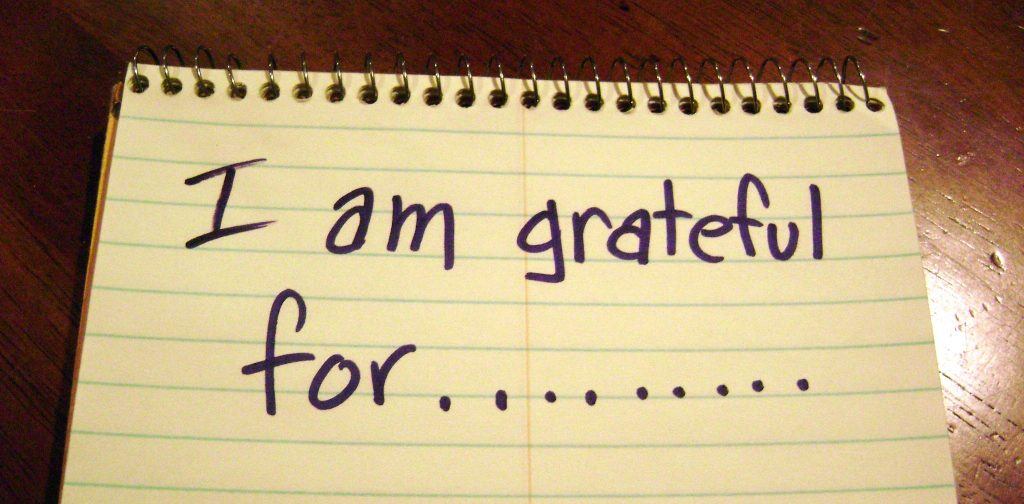What The Science Says: 9 Ways Gratitude Improves Your Life

How gratitude improves your life has been studied and verified by science. A gratitude practice can improve everything from your attitude about your life to your health. This is worth doing, so get at it.
MANY OF us touched on something this past week that’s very important to understanding what’s good in our lives despite its travails. In America, we came together with family and friends and celebrated the feast that is Thanksgiving. During that day many of us took a moment to look past day-to-day challenges and practiced gratitude, if only for a moment.
Sitting around the Thanksgiving Day table at my sister’s home was myself, the lady of the house, her daughter and her closest friend, Diane and her family. Diane’s head was covered with a hat to hide the sparse hair remaining after bouts of radiation and chemotherapy. We held hands and Diane said the prayer.
What do you think she said?
Despite the current travails of her life, Diane spoke about what she’s grateful for: Her daughter sitting near who just returned from her Freshman year at Brown University to share these moments with us; her daughter across the table still in high school who is emerging into adulthood; her man beside her who has stepped up to be her rock against which she can lean when buffeted by pain and fear; her community who came together to ensure that she won’t miss a rent payment or meal; her closest friend, my sister, who tirelessly drives her to doctor appointments, shops for food, strokes her face.
Picking through the spiritual, emotional and physical carnage that is cancer, Diane readily found her nuggets of gratitude to express during that Thanksgiving meal. More importantly, she endeavors to do this every day. To do so is not only uplifting for her, but may help save her life.
The rest of this missive is about gratitude.
In this article, you’ll discover:
- How and why cultivating gratitude improves your life;
- A video series by the world’s foremost gratitude expert;
- How to develop your own simple gratitude practice; and
- My gratitude practice, complete with a pic of my journal.
Let’s dig in…
9 Ways Gratitude Improves Your Life
Gratitude is popular these days. Perhaps this is because there are many challenges that confront the average person, and we seek a way to deal with it all. Insufficient finances, long work and commute hours, frazzled relationships and chronic health issues all provoke and sustain debilitating stress levels that can make us feel overwhelmed and confused.
When engulfed in all that’s wrong in your life, it may be unnatural to see what’s right. And yet, if your stomach is mostly full, your body warm, dry and not in constant pain, then there’s something to be grateful for. Moreover, if you have a friend or family member that cares about you; if you have something you enjoy doing; if there’s something that evokes even just a few moments of joy in your life – then you have reasons to practice gratitude.
Yes, cultivating gratitude is a practice.
To aide us in our understanding of the benefits of being mindful of the many things in our lives for which we can choose to consciously recognize and be grateful, let’s turn to four sources of inspiration and information for this article:
- Robert A. Emmons, Ph.D., the world’s leading scientific expert on gratitude and author of The Little Book of Gratitude, among others;
- Amy Morin, psychotherapist and the author of 13 Things Mentally Strong People Don’t Do, who wrote the Forbes article about gratitude I’ll be referencing;
- Douglas Main, journalist and author who wrote the Newsweek article about gratitude I’ll be referencing; and
- James Clear, habits learning expert and author of a yet another gratitude article, this one focusing on making a habit of being grateful, about which I’ll explore with you.
In his Newsweek article, Douglas Main writes that gratitude comes from the Latin for gratia,meaning grace or thankfulness (depending on context) and is strongly and consistently associated with greater happiness, as well as better physical and mental health.
“Gratitude helps people feel more positive emotions, relish good experiences, improve their health, deal with adversity, and build strong relationships.”
Look around. Apparently there are few situations in which gratitude doesn’t seem to have a positive effect. A psychologist from the University of Birmingham noted in 2013 that:
“[The] list of potential benefits is almost endless: fewer intellectual biases, more effective learning strategies, more helpfulness towards others, raised self-confidence, better work attitude, strengthened resiliency, less physical pain, improved health, and longevity.”
I’ll place a synopsis of what each of the above expert sources has to say in the light-gray rectangles you’ll see below, along with my commentary.
#1 Gratitude opens the door to more relationships
Once that door to more relationships is opened wider thru enhanced empathy toward others, which also tends to reduce aggressive behaviors, then…
#2 Gratitude enhances empathy and reduces aggression
One 2006 study in the journal Psychological Science found that those who expressed more gratitude were also more likely to help out others, possibly due to a heightened sense of empathy. Empathy increases when people are thankful, a key component of gratitude. A 2012 paper in Social Psychology and Personality Science found that higher levels of gratitude were linked to greater empathy and lowered aggression. “Gratitude motivates people to express sensitivity and concern for others,” the researchers wrote. (2)
Given how bifurcated our society is, both in American and in several places in Europe and beyond, it’s encouraging to think that we can become more civil and sensitive to one another simply by being grateful for what we have and experience.
#3 Gratitude improves self-esteem
A 2014 paper in the Journal of Applied Sports Psychology found that athletes who expressed more gratitude toward their coaches and also in general had higher self-esteem two and six months later compared to those who weren’t as openly thankful. (2)
Very little is accomplished without self-esteem. If you think you’re worthless, you’ll act to verify this presumption. Seeking to be grateful for all what’s right in your life builds that empathy — both for yourself and others — which then builds up self-esteem.
#4 Gratitude increases mental strength and resilience
In a 2006 study in the journal Behaviour Research and Therapy, scientists found that Vietnam War veterans with high levels of gratitude were more resilient, and less impacted by post-traumatic stress disorder. Another 2003 paper in the Journal of Personality and Social Psychology found that people with neuromuscular diseases who kept “gratitude journals” reported a greater sense of well-being and more positive moods at the end of the study, compared with those who didn’t make such lists. (2)
It could be that mental toughness and resiliency are augmented by gratitude because practicing it changes the channel. What I mean by that is you focus on something other than you’re own pain. Something positive and uplifting, rather than negative and depressing.
Whatever you focus on you become.
#5 Gratitude improves psychological health and self worth
Dr. Emmons says self worth is improved because when you’re grateful, you have the sense that someone else is looking out for you—someone else has provided for your well-being, or you notice a network of relationships, past and present, of people who are responsible for helping you get to where you are right now. (3)
You relieve yourself of self-condemnation when your focused intention is on ferreting out what’s good in your life rather than what’s not.
#6 Grateful people are more hopeful and healthier
Some of this can possibly be shrugged off as a by-product of happiness: Those who are feeling better tend to be more thankful. But this is not always the case. Dozens of studies have shown that when people actively take the time to list the things they are grateful for, they feel better mentally and physically than participants who haven’t done the same.
In other words, gratitude’s benefits are not only correlational, but in some cases causal. Gratitude can act “directly, as a causal agent of well-being; and indirectly, as a means of buffering against negative states and emotions,” reads a 2009 paper in Counselling Psychology Review. (2)
Correlation is, for instance, when you get up early in the morning and make a cup of coffee before sunrise, and soon the sun rose. Hopefully, you would not assert that the sun rose because you made coffee, but if it did, that would be “causal”.
What the above cited studies indicate is that it’s because of consistent gratitude practice that practitioners are healthier than those without this practice, which adds more evidence to the adage: “Mind over matter”.
#7 Gratitude improves physical health
This is unsurprising — seeking the positive aspects of your life for which you’re grateful makes you feel good about yourself, and when you value you, it naturally leads to taking care of yourself.
#8 Gratitude allows us to celebrate the present because it magnifies positive emotions
But gratitude makes us appreciate the value of something, and when we appreciate the value of something, we extract more benefits from it; we’re less likely to take it for granted.
In effect, gratitude allows us to participate more in life. We notice the positives more, and that magnifies the pleasures you get from life. Instead of adapting to goodness, we celebrate goodness. We spend so much time watching things—movies, computer screens, sports—but with gratitude we become greater participants in our lives as opposed to spectators. (3)
To be mindful of the present moment is to value it.
#9 Grateful people experience less stress and sleep better
Writing in a gratitude journal improves sleep, according to a 2011 study published in Applied Psychology: Health and Well-Being. Spend just 15 minutes jotting down a few grateful sentiments before bed, and you may sleep better and longer. (1)
A 2009 study in the Journal of Psychosomatic Research found that those who expressed gratitude more often slept better and longer than those who didn’t. (2)
It makes perfect sense that if you have less stress in your life, you’ll have more sleep, because their will be less anxiety to keep you tossing and turning all night long.
In light of these eight benefits that a gratitude practice can confer upon you, why not cultivate one?
Develop Your Simple Gratitude Practice
Dr. Robert Emmons makes it titillating:
Gratitude journals and other gratitude practices often seem so simple and basic; in our studies, we often have people keep gratitude journals for just three weeks. And yet the results have been overwhelming. We’ve studied more than one thousand people, from ages eight to 80, and found that people who practice gratitude consistently report a host of benefits. (source)
He goes on to list many physical, psychological and social benefits derived by those who practice gratitude, some of which I’ve touched on above:
Physical
• Stronger immune systems
• Less bothered by aches and pains
• Lower blood pressure
• Exercise more and take better care of their health
• Sleep longer and feel more refreshed upon waking
Psychological
• Higher levels of positive emotions
• More alert, alive, and awake
• More joy and pleasure
• More optimism and happiness
Social
• More helpful, generous, and compassionate
• More forgiving
• More outgoing
• Feel less lonely and isolated.
Dr. Emmons points out that the social benefits are especially significant because gratitude is a social emotion. It’s a relationship-strengthening emotion because it requires us to see how we’ve been supported and affirmed by others.
This cuts to very heart of his definition of gratitude, which has two components.
First, gratitude is an affirmation of goodness. We affirm that there are good things in the world from which have come the various gifts and benefits we have. This doesn’t mean that life is perfect, but when we look at life as a whole, gratitude encourages us to identify some amount of goodness in our life.
The second part of gratitude is discerning where that goodness comes from. We recognize the sources of this goodness as being outside of ourselves. It didn’t necessarily come from any prideful thing we did ourselves. We can appreciate positive traits in ourselves, but authentic gratitude involves a humble dependence on others: We acknowledge that other people—or even higher powers, if you’re of a spiritual mindset—gave us many gifts, big and small, to help us achieve the goodness in our lives.
Spend eight minutes watching Dr. Emmons in action:
Click here for more of Dr. Emmons' gratitude videos.
You need only two things to implement a consistent and effective gratitude practice:
- Mindfulness and
- Process.
By “Mindfulness” I mean being consistently and persistently aware of your monkey mind — that incessant chatter that often is going on and on about attitudes that are self-defeating. Mindfulness also refers to remembering to practice gratitude.
By “Process” I mean whatever system you create that becomes your daily gratitude habit.
I earlier mentioned James Clear, the expert on making habits that stick, but what he really teaches is:
“Systems beats goals.”
What he means by his, I think, is that if you develop a process, system or something that becomes entwined into your daily life, then inevitably — as one step leads to another and eventually a thousand miles is traveled — you get to your goal.
In his article about gratitude, Mr. Clear writes that his gratitude-making “system” is anchored in his evening meal:
“When I sit down to eat dinner, I say one thing that I am grateful for happening today.”
At the time his article was written, he had been practicing this dinner-evoked habit for three years. He learned these five lessons, which I pretty much copy verbatim:
- It’s useful to force yourself into a positive frame of mind at least once per day. Everyone has bad days and frustrating moments, myself included. But no matter what happens each day, when I sit down for dinner I am forced to think about the good in my life for at least a few seconds. The result is that there is not a day that goes by without me specifically stating something positive that is happening around me. Positive thinking opens your eyes to more opportunities.
- The individual impact of any one piece of gratitude is small, but the cumulative effect is huge. The power of this habit comes from a multiplier effect that takes hold after practicing it for a month or two. You begin to realize that nearly everyday is a good day (at least in a small way).
- You start to realize how insignificant monetary things are for your day-to-day happiness. The majority of my grateful moments don’t cost a dime: time spent with friends and family, something nice someone said, a good workout that day. That’s not to say money is unimportant, but there is something comforting in realizing that the moments you’re actually grateful for each day are free.
- I have stuck with the habit because it is stupidly small. I can’t name many habits that I have been able to pick up immediately and follow every day for three years. Perhaps the biggest reason that I have maintained so much consistency with this habit is that it is incredibly small. Do things you can sustain.
- I have stuck with the habit because it is perfectly tied to another behavior. Using the idea of habit stacking, I stacked my gratitude habit on top of my habit of eating dinner each night. It is so much easier to build a new habit into your lifestyle when you choose the right trigger.
[Read James Clear’s entire article here.]
I do something different for my gratitude practice. Each morning while the water is heating up for coffee or tea, I grab my gratitude notebook and write down the three things for which I’m grateful on that day.
Admittingly, sometimes I have to stare off into space and conjure something for which to be grateful that I haven’t already logged in the journal ten times already. But that’s a good thing, because within a week or so you’ll have gone through the obvious candidates:
- I’m grateful for my children
- I’m grateful for having food
- I’m grateful for my work, etc.
That leaves the previously ignored events in your life that should be noted, like:
- I’m grateful that all those lights turned green so I wasn’t late to work
- I’m grateful that I’m communicating more clearly with my wife/children/boss/friends
- I’m grateful for the smile that clerk flashed at me when helping me find such and such
This is a picture of my gratitude journal:
Perhaps this is the only time I’m grateful that my handwriting is so atrocious that it’s illegible. Still, you may notice that in addition to my list of three things I’m grateful for each day, I also list three things I want to accomplish that day. Suffice to say, write down whatever it is you wish to experience, and then refer to it from time to time throughout the day so you stay mindful.
Your Takeaway
We all have the ability and opportunity to cultivate gratitude. Simply take a few moments to focus on all that you have – rather than complain about all the things you think you deserve. Developing an “attitude of gratitude” is one of the simplest ways to improve your satisfaction with life.
If you need more inspiration to begin your own gratitude practice, refer to the nine ways gratitude improves your life and focus in on the one that would most make a difference to you.
Then, grab a notebook and get cracking!
Last Updated on July 7, 2023 by Joe Garma





